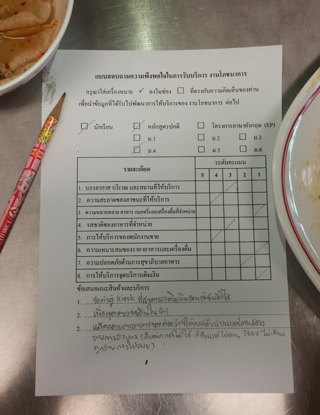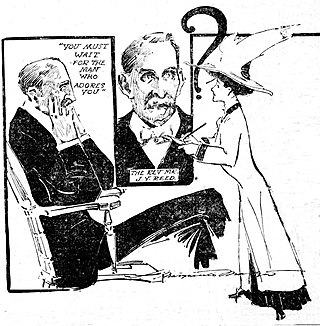
Incremental reading is a software-assisted method for learning and retaining information from reading, which involves the creation of flashcards out of electronic articles. "Incremental reading" means "reading in portions". Instead of a linear reading of articles one at a time, the method works by keeping a large list of electronic articles or books and reading parts of several articles in each session. The user prioritizes articles in the reading list. During reading, key points of articles are broken up into flashcards, which are then learned and reviewed over an extended period with the help of a spaced repetition algorithm.
Eh is a spoken interjection used in many varieties of English. The oldest Oxford English Dictionary defines eh as an "interjectional interrogative particle often inviting assent to the sentiment expressed." Today, while eh has many different uses, it is most popularly used in a manner similar in meaning to "Excuse me?", "Please repeat that", "Huh?", or to otherwise mark a question. It is also commonly used as an alternative to the question tag "right?", as a method for inciting a reply, as in "Don't you think?", "You agree with me, right?", as in, "It's nice here, eh?". In the Americas, it is most commonly associated with Canada and Canadian English, though it is also common in England, Scotland, and New Zealand. It is also known in some American regions bordering Canada, including the area stretching from northern Wisconsin up to Michigan's Upper Peninsula. Similar interjections exist in many other languages, such as Azerbaijani and Italian.
A sound bite or soundbite is a short clip of speech or music extracted from a longer piece of audio, often used to promote or exemplify the full length piece. In the context of journalism, a sound bite is characterized by a short phrase or sentence that captures the essence of what the speaker was trying to say, and is used to summarize information and entice the reader or viewer. The term was coined by the U.S. media in the 1970s. Since then, politicians have increasingly employed sound bites to summarize their positions.

An interview is a structured conversation where one participant asks questions, and the other provides answers. In common parlance, the word "interview" refers to a one-on-one conversation between an interviewer and an interviewee. The interviewer asks questions to which the interviewee responds, usually providing information. That information may be used or provided to other audiences immediately or later. This feature is common to many types of interviews – a job interview or interview with a witness to an event may have no other audience present at the time, but the answers will be later provided to others in the employment or investigative process. An interview may also transfer information in both directions.
A smear campaign, also referred to as a smear tactic or simply a smear, is an effort to damage or call into question someone's reputation, by propounding negative propaganda. It makes use of discrediting tactics. It can be applied to individuals or groups. Common targets are public officials, politicians, political candidates, activists, and ex-spouses. The term also applies in other contexts, such as the workplace. The term smear campaign became popular around 1936.

A Likert scale is a psychometric scale named after its inventor, American social psychologist Rensis Likert, which is commonly used in research questionnaires. It is the most widely used approach to scaling responses in survey research, such that the term is often used interchangeably with rating scale, although there are other types of rating scales.

A questionnaire is a research instrument that consists of a set of questions for the purpose of gathering information from respondents through survey or statistical study. A research questionnaire is typically a mix of close-ended questions and open-ended questions. Open-ended, long-term questions offer the respondent the ability to elaborate on their thoughts. The Research questionnaire was developed by the Statistical Society of London in 1838.
Journalistic ethics and standards comprise principles of ethics and good practice applicable to journalists. This subset of media ethics is known as journalism's professional "code of ethics" and the "canons of journalism". The basic codes and canons commonly appear in statements by professional journalism associations and individual print, broadcast, and online news organizations.

A job interview is an interview consisting of a conversation between a job applicant and a representative of an employer which is conducted to assess whether the applicant should be hired. Interviews are one of the most common methods of employee selection. Interviews vary in the extent to which the questions are structured, from an unstructured and informal conversation to a structured interview in which an applicant is asked a predetermined list of questions in a specified order; structured interviews are usually more accurate predictors of which applicants will make suitable employees, according to research studies.

Owing to its origin in ancient Greece and Rome, English rhetorical theory frequently employs Greek and Latin words as terms of art. This page explains commonly used rhetorical terms in alphabetical order. The brief definitions here are intended to serve as a quick reference rather than an in-depth discussion. For more information, click the terms.
A ladder interview is an interviewing technique where a seemingly simple response to a question is pushed by the interviewer in order to find subconscious motives. This method is popular for some businesses when conducting research to understand the product elements personal values for end user.
A self-report study is a type of survey, questionnaire, or poll in which respondents read the question and select a response by themselves without any outside interference. A self-report is any method which involves asking a participant about their feelings, attitudes, beliefs and so on. Examples of self-reports are questionnaires and interviews; self-reports are often used as a way of gaining participants' responses in observational studies and experiments.
Person-centered ethnography is an approach within psychological anthropology that draws on techniques and theories from psychiatry and psychoanalysis to understand how individuals relate to and interact with their sociocultural context. The term was first used by Robert I. Levy, a psychoanalytically trained psychiatrist, to describe his psychodynamically informed approach to interviewing during his anthropological fieldwork in Tahiti and Nepal.

A semi-structured interview is a method of research used most often in the social sciences. While a structured interview has a rigorous set of questions which does not allow one to divert, a semi-structured interview is open, allowing new ideas to be brought up during the interview as a result of what the interviewee says. The interviewer in a semi-structured interview generally has a framework of themes to be explored.

An unstructured interview or non-directive interview is an interview in which questions are not prearranged. These non-directive interviews are considered to be the opposite of a structured interview which offers a set amount of standardized questions. The form of the unstructured interview varies widely, with some questions being prepared in advance in relation to a topic that the researcher or interviewer wishes to cover. They tend to be more informal and free flowing than a structured interview, much like an everyday conversation. Probing is seen to be the part of the research process that differentiates the in-depth, unstructured interview from an everyday conversation. This nature of conversation allows for spontaneity and for questions to develop during the course of the interview, which are based on the interviewees' responses. The chief feature of the unstructured interview is the idea of probe questions that are designed to be as open as possible. It is a qualitative research method and accordingly prioritizes validity and the depth of the interviewees' answers. One of the potential drawbacks is the loss of reliability, thereby making it more difficult to draw patterns among interviewees' responses in comparison to structured interviews. Unstructured interviews are used in a variety of fields and circumstances, ranging from research in social sciences, such as sociology, to college and job interviews. Fontana and Frey have identified three types of in depth, ethnographic, unstructured interviews - oral history, creative interviews, and post-modern interviews.

The Voyage That Shook The World is a 2009 dramatised documentary film commissioned by Creation Ministries International, a Christian Young Earth creationist organisation, and produced by Fathom Media. It was released to mark the 200th anniversary of Charles Darwin's birth and the 150th anniversary of the publication of his seminal work On the Origin of Species.
An online interview is an online research method conducted using computer-mediated communication (CMC), such as instant messaging, email, or video. Online interviews require different ethical considerations, sampling and rapport than practices found in traditional face-to-face (F2F) interviews. Online interviews are separated into synchronous online interviews, for example via online chat which happen in 'real time' online and asynchronous online interviews, for example via email conducted in non-real time. Some authors discuss online interviews in relation to online focus groups whereas others look at online interviews as separate research methods. This article will only discuss online interviews.
In media studies, concision is a form of broadcast media censorship by limiting debate and discussion of important topics on the rationale of time allotment.

The Unknown Known is a 2013 American documentary film about the political career of former U.S. Secretary of Defense and congressman Donald Rumsfeld, directed by Academy Award winning documentarian and filmmaker Errol Morris. It is a summary of 33 hours of interviews that Morris conducted with Rumsfeld over eleven separate sessions during visits to Newton, Massachusetts. The film was released on April 4, 2014, by Radius-TWC, and is dedicated to the memory of Roger Ebert.

An interview in qualitative research is a conversation where questions are asked to elicit information. The interviewer is usually a professional or paid researcher, sometimes trained, who poses questions to the interviewee, in an alternating series of usually brief questions and answers. They can be contrasted with focus groups in which an interviewer questions a group of people and observes the resulting conversation between interviewees, or surveys which are more anonymous and limit respondents to a range of predetermined answer choices. In addition, there are special considerations when interviewing children. In phenomenological or ethnographic research, interviews are used to uncover the meanings of central themes in the life world of the subjects from their own point of view.











